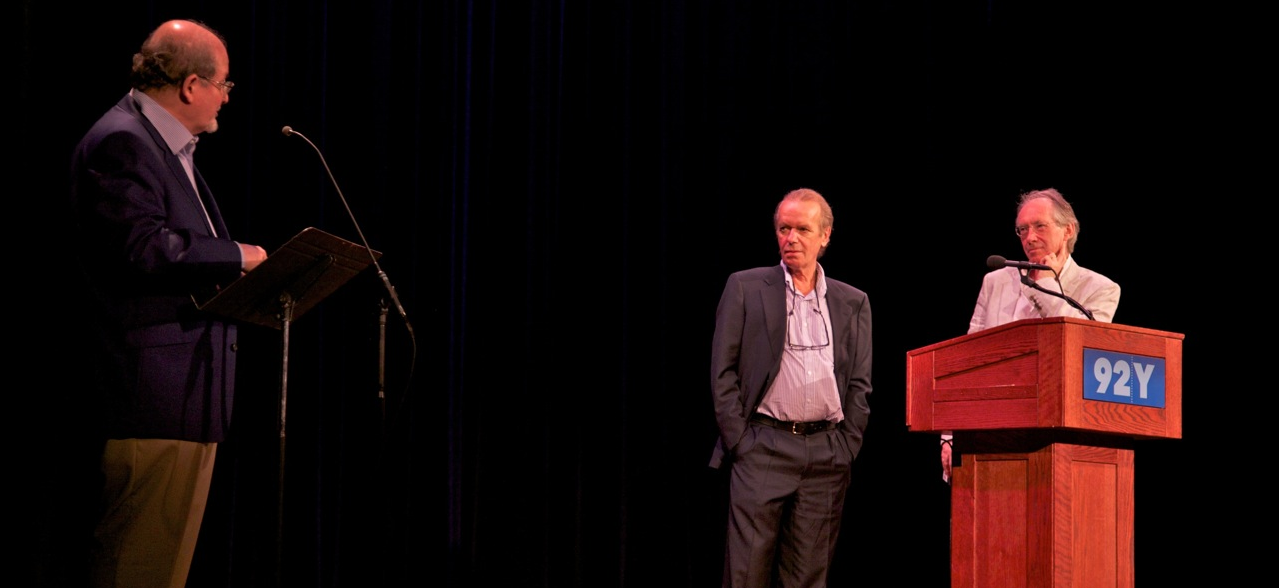You have no items in your cart. Want to get some nice things?
Go shopping
On Monday evening the heart of literary London was transplanted to New York. At 92nd Street Y – a cultural and community centre on the Upper East Side – Salman Rushdie played compere to Martin Amis and Ian McEwan, who read passages from their latest novels, Lionel Asbo (2012) and Sweet Tooth (2012), and took questions from the audience. For Amis: “Has moving to Brooklyn altered your writing?” For McEwan: “How has your approach to romance changed since, on your first night at university, you introduced yourself to a girl by asking if she’d f**k you?” Their answers to come.
Sir Salman (top half dressed for dinner, bottom half for basketball) began the show self-mockingly, introducing this “rare occasion” on which “the triumvirate…the heads of the families” who were once charged with “dominating and distorting British fiction” were again to share a microphone.
The three men are emblems of 1970s and ’80s literary London, an epoch in miniature full of leonine upstarts taking shots at the ‘oldsters’. But like an exploding star they have dispersed and now – perhaps more coolly – light elsewhere. Rushdie moved to Manhattan in 2000 and Amis to Brooklyn in 2011, both prompting wounded prattle in the British press. “Since Martin and I have established our beachheads in New York,” said Rushdie, “Ian has to look after England on his own” – joking that the author had bought up most of Gloucestershire in order to do so.
A tribute to Christopher Hitchens (“an empty chair”) led to an explanation of a game Amis and Hitchens played in which ‘love’ in the titles of books, films or songs is swapped for ‘hysterical sex’. Thus, Hysterical Sex in the Time of Cholera. My contribution: Hysterical Sex Will Tear Us Apart. If only a novel had been written called Unrequited Love.
Introducing Amis, Rushdie compared him to P.G. Wodehouse (on whom, he added, no one would ever challenge the authority of The Hitch). For Rushdie, both Amis and Wodehouse created voices, each of which epitomise an instantly recognisable Englishness yet are never heard in the mouths of Englishmen. They are mimicries, rather, heightened into new vocabularies.
And so enter Martin Amis to rattling applause. He raised a palm: “Stop! In the Name of Hysterical Sex.”
He began by marking a difference between his native and adopted lands. “If your favourite writer – who also happened to be your long-lost brother – was reading in the next house along,” he rasped, “it would never even occur to you to go and stick your head around the door.” Americans, in contrast, “come and listen to things”.
And he quickly had the listeners laughing. The section he read from Lionel Asbo involved a dinner between Lionel and his five brothers – a racial salad of lowlifes named John, Paul, George, Ringo and Stephen. It could be useful for the population to be organised under Beatleine classifications, Amis suggested: “It might help with legal matters. For instance: ‘No, this is far too complicated a crime for a Ringo.’ He tilted his head. “My wife says I’m a Paul trying to be a John. What she doesn’t know is I’m secretly a George.”
Amis’s novel makes a circus of fatuous success, persistent sorrow and cigarette-stubbed tinned lager-grime. He argued that misery makes up the tradition, as “few writers write in white. It doesn’t show up on the page. The energy of Dickens is all in the villains and the bad stuff. The good characters are faceless”. The passage he chose described a child named Toilet, exploding silicone breasts and the consumption of forty-eight G&Ts. It is full of features.
However much of a treat it was to witness Amis read his own prose, it brought the true pleasure of live literary events into focus. I sat in row X, and watched the undefined shape of a man whose judgments have so often articulated a vague instinct of mine, and in whose writing life I have so often searched for dim parallels to my own. The tingle of disbelief on seeing the person with whom one has spent so much time in silent conversation, with whose voice one is so familiar that to encounter it in a vessel other than a book registers as a faint surprise: there is the real thrill.
Amis’s gravelly drawl has a reverberating weight which tends to induce admiring silences. It is a hard voice to follow. It was over to Ian.
“Though the Atlantic ocean now lies between us, the hysterical sex between us is undying.” Any fears departed.
McEwan snappily recited a skilful passage from Sweet Tooth. Rushdie had described McEwan as a great writer of first chapters (citing 1997’s Enduring Love) – a result, he suggested, of his early mastery of the short story. This passage demonstrated the same virtuosity. Serena Frome, an MI5 officer, reads a file containing a short story published by a possible recruit, McEwan’s challenge being to let the reader read over Serena’s shoulder. A tale of stalking and adultery, its performance was annotated by the audience’s startled whelps – none so excited as at the sudden mention of “mutant genitalia”.
During the questions McEwan confirmed that he’s no longer in the business of mild sexual harassment; the reply he received on that first night at university was: “Would you kindly f**k off?”. Amis, meanwhile, conjectured that it takes three years for a new way of life to “trickle down the spine” and present itself for fiction. “So maybe in a year,” he added, “I’ll have something to say about America.”
And would they change anything about their books? For Amis, “rewriting early novels is the depth of frivolity”; he will leave “the mess of the first four novels alone”. As for McEwan, “the commas in First Love, Last Rites… I thought it was jolly cunning to have commas instead of full stops”. Now, however, “it doesn’t look cunning at all”.
By the end, it was an unmistakable sense of fraternity that marked the evening. Their comradely wistfulness and celebration seemed to pile around them invisible memorabilia from the glory days of ’70s and ’80s London: plates at greasy spoons, literary magazines, precocious awards. The famous 1983 Granta photograph might have been strung up on the back wall. They became at times an evocation of the fairytale that, with phoney nostalgia, we trust they lived. That prime was almost about youth, about taking on the oldsters, and has become in the discussion of British fiction compartmentalised and even solidified into a period. Monday’s event, among the Upper East Side’s limousines and surely plastic primroses, raised its spectre. This is not to say that it was like some ‘legends’ exhibition football match or a Rolling Stones concert. Only that to see three of that period’s horsemen – the fourth saddle kept warm for Julian Barnes – was a peculiarly pensive retrospection, as if its tan still hung on their skin.

About Luke Maxted
Luke graduated with a first from Oxford in 2012. He has since gained work experience at, among others, Literary Review, Diplomat Magazine, New Statesman, Carcanet Press and The Guardian. He is spending his summer in Manhattan researching Vladimir Nabokov and will return to Oxford in October to begin postgraduate study in modern literature. He contributes freelance work to a number of publications.





Thanks for sharing me this wonderful article, Here you will play the klondike solitaire game that you can play without using real money.